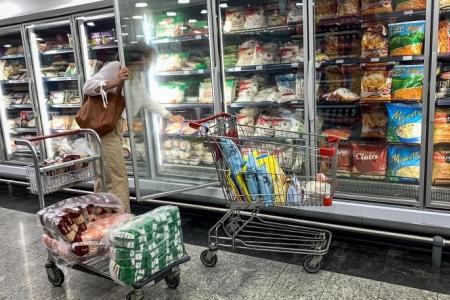World food prices fell in June but remain very high: UN agency
PARIS (AFP) - World food prices, including for wheat, fell in June for a third month running, despite remaining near an all-time high, the UN Food and Agriculture Organisation (FAO) said on Friday (July 8).
Export flow disruptions resulting from Russia's invasion of Ukraine on Feb 24 and international sanctions on Moscow have sparked fears of a global hunger crisis.
Russia and Ukraine, whose vast grain-growing regions are among the world's main breadbaskets, account for a huge share of the globe's exports in several major commodities, including wheat, vegetable oil and corn.
After a record spike in March due to the war, the FAO food price index - a measure of the monthly change in international prices of a basket of food commodities - fell 2.3 per cent in June.
It is still 23.1 per cent higher than it was in June 2021.
"Although the FAO Food Price Index dropped in June for the third consecutive month, it remained close to the all-time high of March this year," said Mr Maximo Torero Cullen, chief economist at the United Nations agency.
Most prices fell in June, including those for grains, vegetable oils and sugar.
Grains fell 4.1 per cent overall. The price of wheat shrank 5.7 per cent, the first time it had dropped since March.
"The decline in June was driven by seasonal availability from new harvests in the northern hemisphere, improved crop conditions in some major producing countries and higher production prospects in the Russian Federation," the UN agency explained.
Russia's wheat yield, which together with Ukraine's represents a quarter of global wheat supplies, was expected to be exceptionally good this year, the FAO said.
Potentially, Russia could export up to 40 million tonnes in 2022-23, it said.
The vegetable oil index dropped 7.6 per cent in June, with the price of sunflower oil, soya bean oil and palm oil all down.
For palm oil, the decline was due to a seasonal rise in production and greater availability from Indonesia.
Despite the general fall, "the factors that drove global prices high in the first place are still at play", Mr Torero Cullen said.
In particular, these were "a strong global demand, adverse weather in some major countries, high production and transportation costs, and supply chain disruptions due to Covid-19, compounded by the uncertainties stemming from the ongoing war in Ukraine".
In comparison, the FAO said meat prices had jumped 1.7 per cent in June, reaching a new record.
The cost of all types of meat, especially chicken, had gone up due to shortages linked to the war in Ukraine and outbreaks of bird flu, the FAO said.
The FAO slightly upped its forecast for global wheat production in 2022 to 2.8 billion tonnes - 0.6 per cent lower than in 2021.
Get The New Paper on your phone with the free TNP app. Download from the Apple App Store or Google Play Store now


